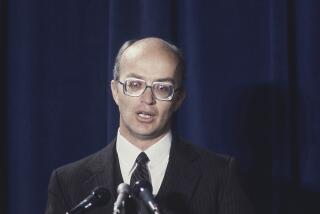THE WHITE HOUSE / HEADHUNTER : Bush’s ‘Gatekeeper’ Starting Over
- Share via
WASHINGTON — Charles G. Untermeyer has seen his White House office staff cut in half. The once unending telephone calls have been reduced to a relative trickle. He is no longer spending both weekend days in his office.
In a city where a ringing telephone and stacked-up messages are signs of power, Untermeyer counts their absence as evidence that he has successfully fulfilled the initial mandate of his job.
As assistant to the President and director of presidential personnel, Untermeyer--known by his nickname “Chase”--is the gatekeeper to the upper levels of the Bush Administration. If you want to work for the President of the United States, he’s the guy to see.
Don’t let the bureaucratic nameplate or his formal and intense demeanor fool you. This is a man who just for the heck of it made his way from Asia to Africa and up the Nile to the no-man’s land of southern Sudan in the midst of a civil war.
The fact that life has finally quieted down in his suite of offices in the White House West Wing means that he has finally carried out the arduous task of filling the top 650 jobs in the Administration.
NEW BEGINNING: Now that he’s gotten the upper reaches of the government down to a vacancy rate of approximately 2%, he’s about to start the job all over again.
It’s time for the Second Year Blues--the time when his colleagues in the White House and in the senior positions of the Cabinet departments decide there must be life outside the rarefied atmosphere at the center of a young Administration.
Some decide to give up the 12- and 14-hour days, the chauffeured cars, the constant feeling of being right in the middle of Something Very Important in Washington, D.C. However, the itch never becomes epidemic.
“Two percent is about as low as it would ever get. People resign, die, get promoted to other jobs,” said Untermeyer, a longtime aide to Bush.
Already, a senior presidential aide--Cabinet Secretary David Bates--has left the White House for the relatively calmer existence of a lawyer in private practice in Washington. In addition, a mid-level White House aide--Tim McBride, Bush’s personal assistant--is on his way out, nominated to be an assistant secretary of commerce. And a senior member of the National Security Council staff who has been a close presidential adviser on Soviet affairs is returning to Harvard.
NEW TALENT: By one estimate before Bush took office, the new Administration would retain no more than 20% of the Ronald Reagan appointees.
The new President, Untermeyer said in a recent interview, “wanted to make clear this was a new Administration, not Ronald Reagan’s third term but George Bush’s first.”
The marching orders, he said, were “to use the talent at hand but to create the freshness that comes from having new people in new places, new faces in old places, and old faces in new places.”
“The guidance I received was, the person who kept his job would be the exception rather than the rule,” Untermeyer said.
The result was that he came very close to hitting the original goal of keeping no more than 20% of the Reaganites. Of the Reagan Administration’s political appointees who were in office when the 40th President left Washington on Jan. 20, 1989, approximately 22% were retained in some capacity.
EARLY CRITICISM: Untermeyer came under sharp criticism as the months of 1989 dragged on and vacancies went unfilled. The problem in naming new people to take over the government offices, he has said, stemmed from the delays in checking out potential appointees--examining their backgrounds for potential conflicts of interest or personal behavior that could prove embarrassing if brought to light in a confirmation hearing.
If he could make one major change in the current approach to finding candidates for the myriad of assistant secretary positions, government commission jobs, or agency posts that he filled, it would be to begin the search before the presidential election.
“The most logical thing to do would be to do personnel work a lot earlier. But that makes no political sense. It gives the opposition the opportunity to accuse you of being presumptuous,” he said.
More to Read
Get the L.A. Times Politics newsletter
Deeply reported insights into legislation, politics and policy from Sacramento, Washington and beyond. In your inbox twice per week.
You may occasionally receive promotional content from the Los Angeles Times.










